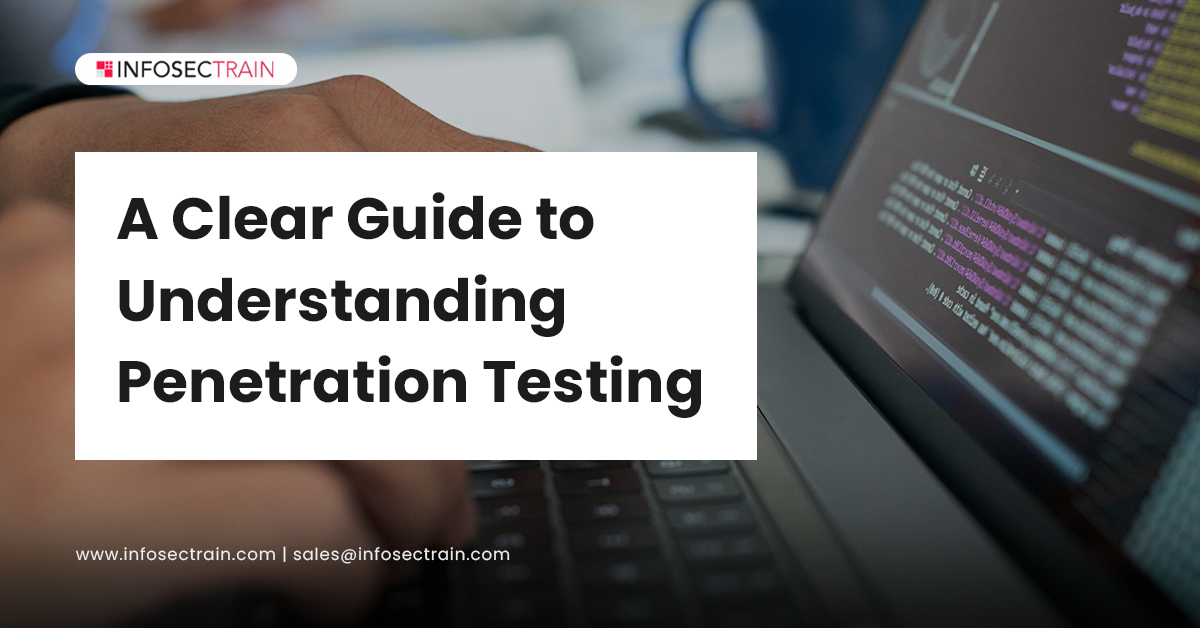A Clear Guide to Understanding Penetration Testing
Penetration Testing has become one of the most integral parts of a comprehensive security program. Pen Testers are responsible for mimicking the actual attackers. They use different tools and methods to exploit the organization’s systems, applications, and networks. Pen Testers think precisely like hackers, and they are responsible for finding the vulnerabilities in the system and they try to exploit them in different ways. At the end of this process, Pen Testers generate a complete report about the vulnerabilities and give it to the security professionals to fix the problems.

There are three types of Penetration Testing methods
WiteBox: In this type of testing, the Penetration Tester is provided with complete details like internal code, target network, and systems.
BlackBox: In this type of testing, the testers are not provided with any information at all. They are not aware of any internal code.
GrayBox: In this type of testing, the penetration tester will be aware of partial details of the system.
Before telling you why penetration testing is important, let me tell you the actual causes of vulnerabilities.
The causes of vulnerabilities:
- Human Errors: Oh yeah! Humans are built to make mistakes. Obviously, there would be code errors, unattended documents, insider threats, inappropriate administration of documents, sharing passwords, and many mistakes that could lead to security breaches.
- User Inputs: SQL injection, buffer overflows, and other security issues are probably familiar to you. This kind of data that is received electronically can be used to attack the receiving system.
- Development Errors: Errors while developing software and hardware can attract hackers. So try to avoid development errors.
- System Connections: It is very important to be conscious while connecting our systems to open connections. One unsecured connection can lead to big damage or data loss.
- Lack of Employee Training: As I said, people/humans often tend to make mistakes, and untrained employees can cause many vulnerabilities and errors.
Scenarios where we need Pen Testing the most:
- We need pen testing when we are willing to find loopholes in our systems.
- Pen testing is used when we want to secure user data.
- When we want to implement new security strategies, pen testers are helpful.
- Finding application security vulnerabilities is very easy with the help of pen testers.
- Nowadays, clients are insisting on incorporating the pen-testing phase as a part of the release cycle.
- Pen testing is used to meet the information security compliance requirements.
- Pen testing is needed while assessing the business impact of successful cyber attacks.
What must be tested?
- Hardware
- Software like operating systems, applications, and services
- Processes
- Network
- End-user behavior
Different Penetration Testing Tools:
Below are some of the great penetration testing tools.
Zmap: Zmap is a lightweight network scanner that can scan everything from your local network to the entire Internet. This free network scanner is ideal for gathering network baseline information.
SimplyEmail: SimplyEmail is an email reconnaissance application that helps you find related material on the Internet using someone’s email address. SimplyEmail is based on the harvester solution and searches the Internet for any data that can be used to provide intelligence about a given email address.
PowerShell-Suite: The PowerShell-Suite is a cluster of Powershell scripts that retrieve data about Windows DLLs, processors, handles, and many other things. We can easily check which particular system is vulnerable to exploitation by using this tool.
Wireshark: Wireshark is perhaps the most popular network protocol analyzer on the planet. Wireshark network traffic capture may reveal which protocols and systems are active and which accounts are the most active and allow attackers to collect sensitive data.
Hydra: Hydra is a tool for breaking passwords. Hydra is the only password pen testing programme that can simultaneously test various protocols and connections. If unlocked, this capability allows a penetration tester to break many passwords on multiple computers at the same time without losing connection.
Hashcat:
Hackers use Hashcat to crack passwords for licit and illicit purposes. By performing brute-force attacks with hashed passwords, the tool aides brute-force attacks in a swift, efficient, and versatile way, it utilizes hash values of passwords that it guesses and matches. As a means to reveal compromised or easy to guess credentials, it is usually used for benign purposes, such as penetration testing.
Pen-Testing with InfosecTrain:
Infosec train is one of the leading training providers with a pocket-friendly budget. So, if you want to get a good grip on the Penetration testing course, then join us to experience an incredible journey with our industry experts. Our courses are available in live instructor-led and self-paced sessions, making it easy for you to take up and complete your learning/training journey at ease. Join InfosecTrain to learn skills that can change your life.
Quiz:
Answer these simple questions to test your knowledge. attempt them only after reading this blog.
1. Which of these is not a Pen Testing type?
- Black Box
- White Box
- Hydra
2. What is Zmap?
- Pen Testing tool
- Pent Testing type
- None
3. Do Pen Testers test the organization’s network?
- Yes
- No
4. Which of these is not a Pen Testing tool?
- White Box
- Hydra
- PowerShell-Suite
5. Which of the following is a cause of vulnerability?
- Lack of management skills
- Human Errors
- Both
So pen down your answers and check them here.







 1800-843-7890 (India)
1800-843-7890 (India)